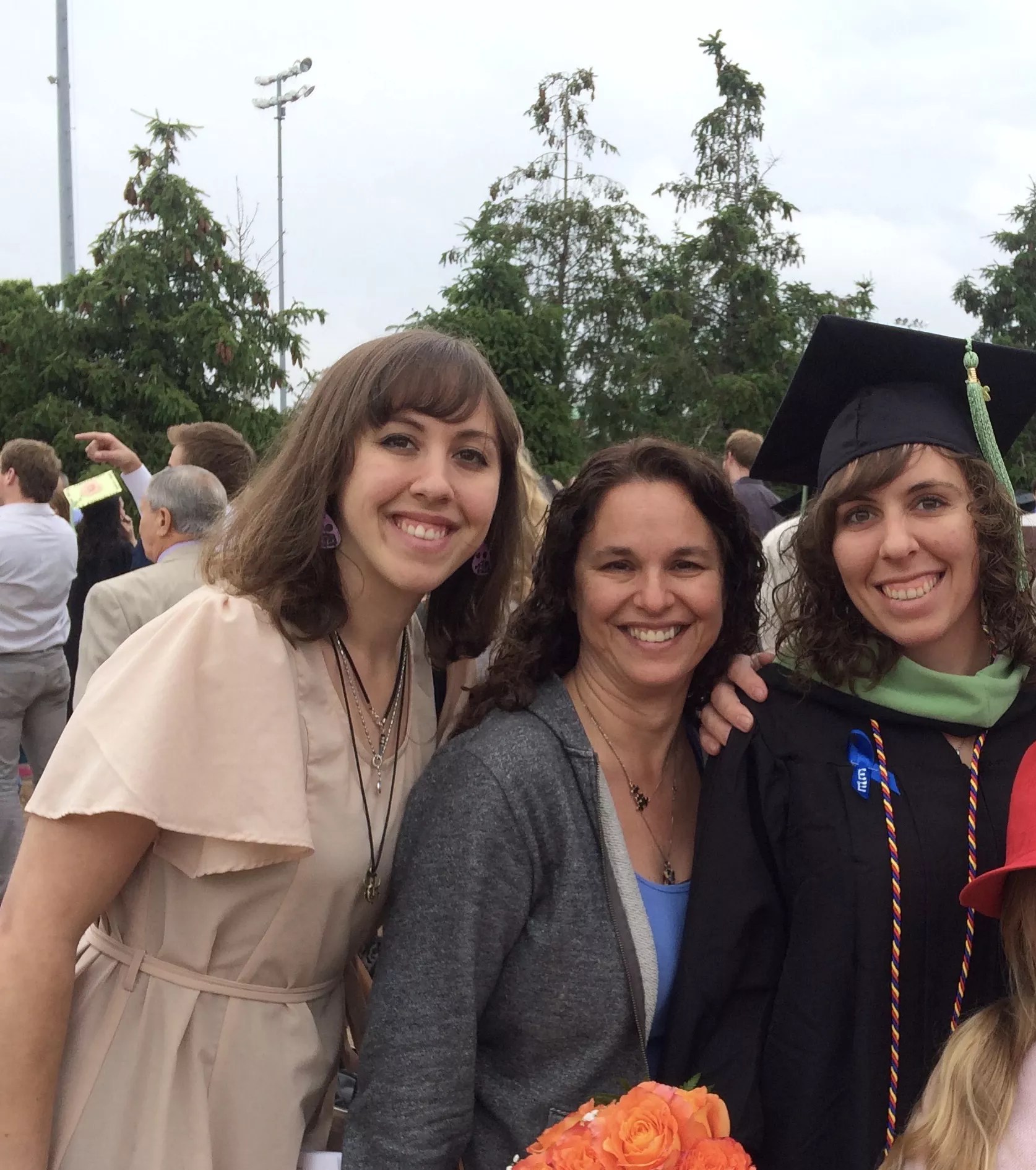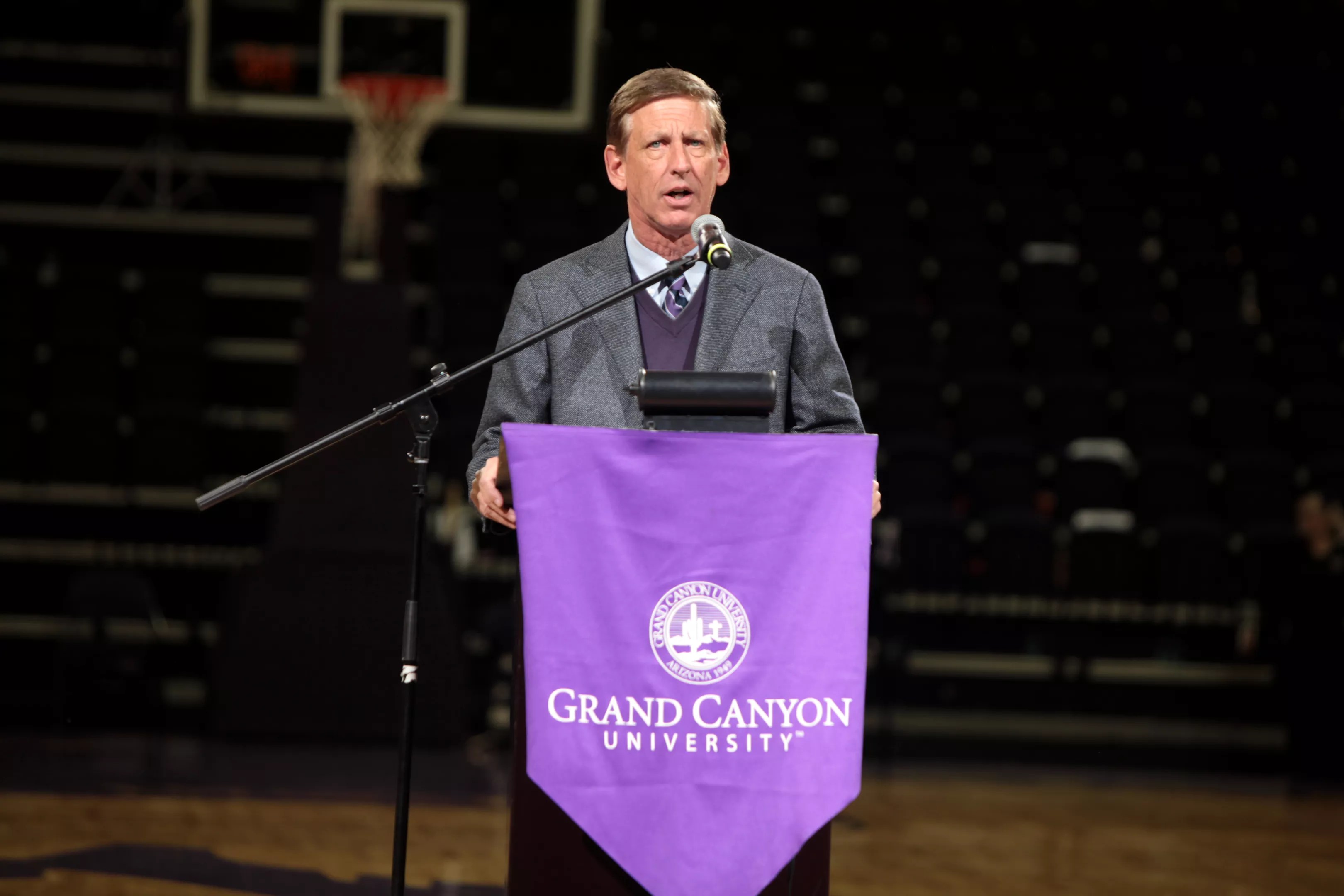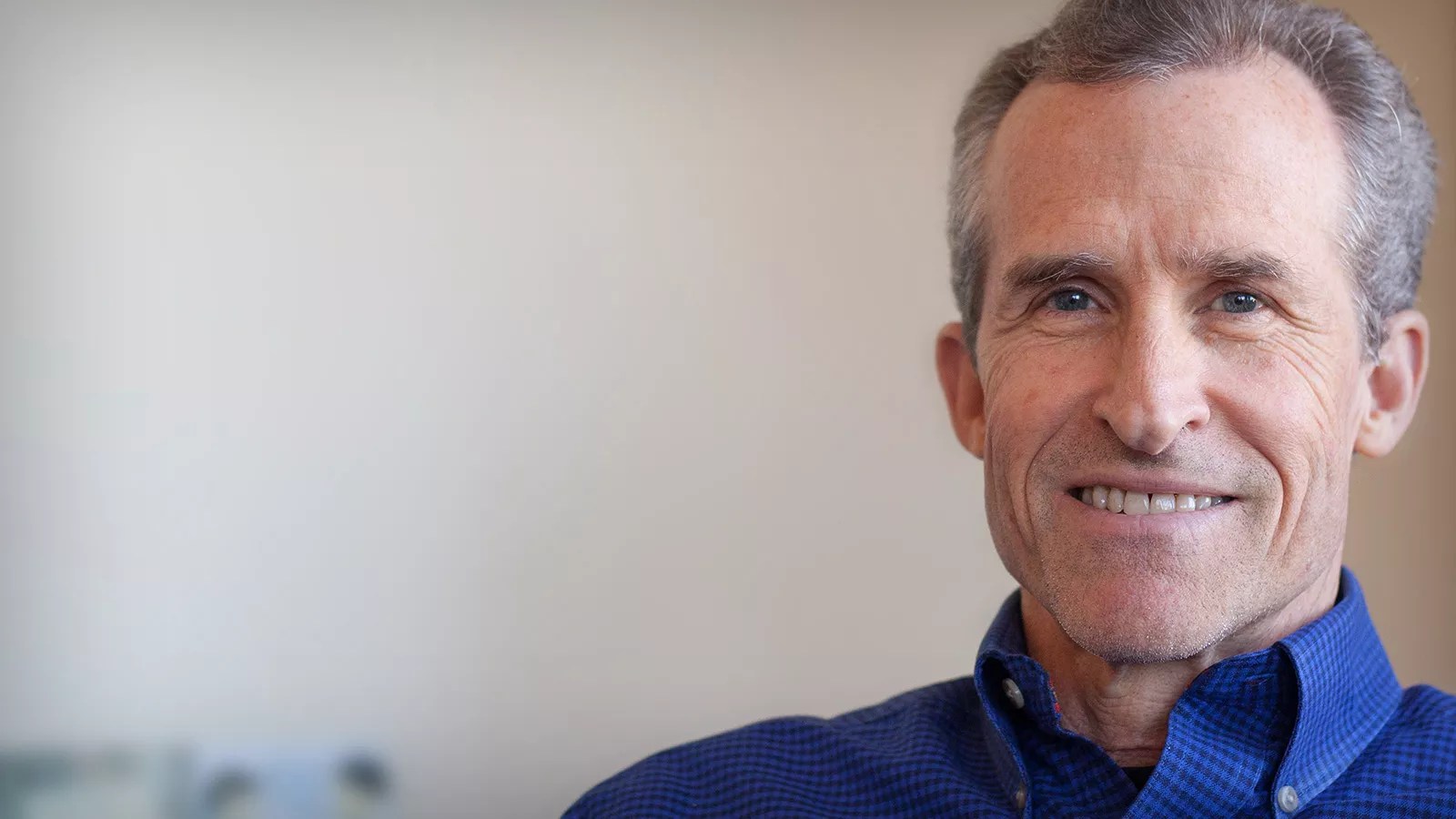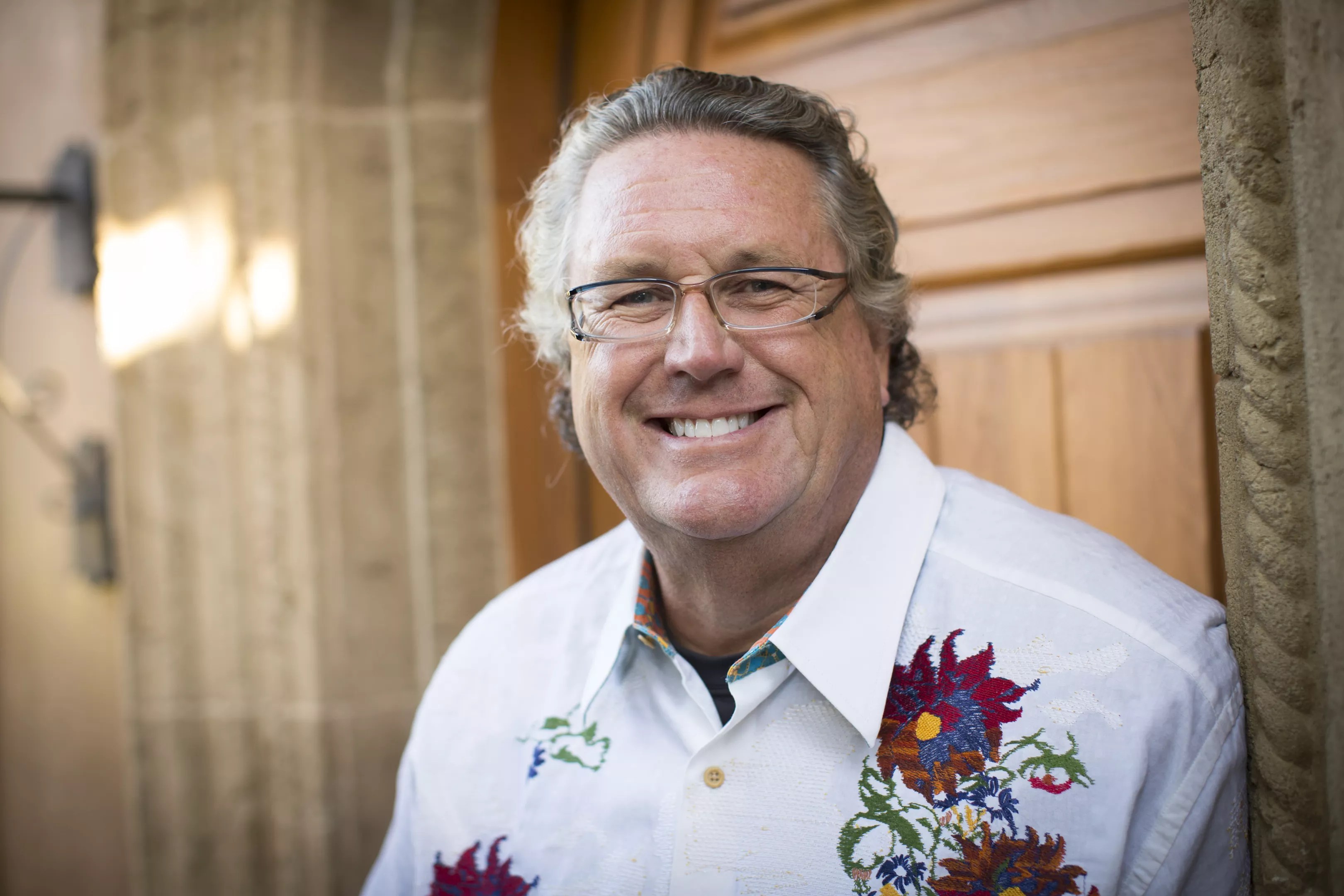
Tim Lane

Audio By Carbonatix
The recruiter arrived during the lunch break. Lisa Coslett met him while she was working at the daycare center. An enthusiastic man named Russ McKee encouraged her to consider a master’s degree in special education. The program was all online, she learned. Coslett was captivated, but, ever the skeptical New Englander, she hesitated. It sounded too good to be true.
She couldn’t afford to take time off work, Coslett explained. If she did the online master’s program, would it interfere with her job? Not only did she need the money as a single parent, she also needed the health insurance.
McKee was reassuring, she said – Grand Canyon University was here to help. The for-profit Phoenix school, which has almost 85,000 students enrolled at either its ground campus or online, would make it work around her schedule, she remembers him saying. So, Coslett filled out the application.
The enrollment process moved like a conveyer belt. A week after she met with McKee, Coslett got an email from her new adviser. Again, Coslett said she voiced concerns about requirements that master’s students leave work for four months during the online program to complete a student-teaching requirement. Again, an adviser said the school would work something out or Coslett could file an appeal, she says.
The 51-year-old single mom was a driven student. She put in hours online whenever she was free at the daycare, earning all As except for one B-minus. A year later, she got a new job as a teacher’s aide at a rural New Hampshire school, under the impression that she could complete her student teaching requirement.
To her, the GCU courses seemed rote and tiresome, but Coslett reminded herself that once she had the degree, she could become a teacher – her dream since she was little.
Coslett felt like she was meant to be a full-fledged teacher, after all. Friends tease her for a habit of blurting out random thoughts and non sequiturs, but as Coslett explained with a laugh, “That’s why I work with kids! Because they’re just as random as I am.”

Coslett, center, at a 2015 graduation ceremony with her daughters, now 25 and 28.
Courtesy of Lisa Coslett
Finally, two years into the program, the issue of leaving her job reared its head in fall 2016. Coslett reminded her rotating cast of advisers that she had long worried about her ability to stop working. The GCU staff told her they would assess her circumstances within the department, and would talk to Coslett’s supervisors.
Coslett was at Target when she got the news: It wasn’t going to work. She would have to leave her job or quit the master’s program. Coslett stood there, frozen in the one spot in the store where she could find a decent cell signal, trying not to move so as to absorb the news. “All this money, and I’m just done?” she thought. She felt like crying.
“I had no choice,” she said. “I can’t quit my job – how am I going to pay my rent and my health insurance?” Standing in the shopping aisle, thousands of dollars in loans for the preceding years suddenly loomed before her. Coslett, a divorced parent, was barely making ends meet month to month. How would she get by now?
Her once-friendly interactions with GCU soured. The school emailed her to say that the blame lay with her employer, the Barrington, New Hampshire, elementary school. Legal-ese crept into the dialogue. “Although this is unfortunate, this is not at the fault of GCU,” an adviser wrote, adding, “Your school previously agreed to shoulder the weight of meeting these requirements and have now reversed their decision.”
GCU said in a statement to Phoenix New Times that students like Coslett are advised of the 16-week, unpaid student-teaching requirement, and “it is up to them to determine how to fulfill this requirement in light of their personal circumstances.”
At a loss, Coslett reached out to her old recruiter on Facebook. McKee remembered her, although he no longer worked for the university. Excited, he asked how the online experience had been. She explained how frustrating and tangled her situation had become. Politely, Coslett wrote that his words – about the flexibility of an online master’s degree – had led to a financial nightmare. It isn’t right, she wrote.
For the first time since Coslett met him, she said, McKee suddenly turned curt. “Best of luck,” he wrote back. “Please stop communicating with me.”
When asked about Coslett’s situation, McKee was nonplussed. “Unfortunately, she couldn’t afford to stop working and student-teach,” he told New Times. “Proper prior planning prevents poor performance,” he added.
McKee, who now works for Franklin Pierce University, said he loved the five years he spent recruiting for GCU across New England. “They’re the No. 1 online university in the country, and they’re doing a fantastic job,” he said.
Two minutes later, he hung up.
Coslett sees it differently. Her voice takes an edge when she describes the Christian university’s manifold online programs.
“They say whatever they need to say to get you into the school,” Coslett said.
By the time GCU President Brian Mueller walked onto the arena’s stage last month, the crowd was already warmed up. Earlier, a student-led band had belted out feel-good Christian rock. “Jesus, Jesus, you make the darkness tremble.” Singers swayed with eyes half-closed. “Jesus, Jesus, you silence fear.”
Mueller, ruddy-faced with a ramrod bearing, is not just the university president. He’s also the CEO of Grand Canyon Education Inc. – a publicly traded company with hundreds of millions in revenue that owns the for-profit, 260-acre university in Phoenix.
Faculty, students, and staff are encouraged to attend Chapel, an hourlong worship service that features music and guest speakers in the university’s 7,500-seat basketball arena. A vault of Bibles is buried at center court.
In a video of the August 28 event, Mueller greeted the new arrivals. “Let me hear you if this is your first Chapel!” There was a small but audible cheer and some clapping. “Welcome!” Then he let loose with what the crowd was waiting for: “Let me hear you if you are back this year for more Chapels!” The students went crazy. Mueller smiled.
In his freewheeling address, Mueller relied on no notes, except when quoting Bible passages. He gestured to emphasize important points, when his voice grew louder until it was practically a shout.
Mueller told the crowd that recently, someone had asked him a rhetorical question about GCU.
“They said, ‘What’s the secret sauce? And what makes it work?'” Mueller said.
The question got him thinking, he explained. What makes a university, company, or government successful? What can overcome corporate dysfunction or political polarization?

GCU President and CEO Brian Mueller speaking at a 2015 event in the university’s basketball arena.
Gage Skidmore/flickr
For the answer, Mueller read from a chapter of the Gospel of John, where Jesus washes the feet of his 12 disciples on the eve of his crucifixion: an act of selfless humility. Mueller read from the Bible: “And since I, your Lord and Teacher, have washed your feet, you ought to wash each other’s feet. I have given you an example to follow. Do as I have done to you.”
Mueller described how the act held a transformative power: The Son of God washed the feet of his followers, not the other way around. He never answered that rhetorical question about Grand Canyon’s “secret sauce.” But from his sermon, the answer was clear. GCU’s secret to success was service.
Left unsaid in Mueller’s speech? The fact that business is booming at the Christian university. Approximately 19,000 students are enrolled on GCU’s ground campus and an astonishing 65,000 people study through the university’s online programs. The university seemingly can’t grow fast enough. Enrollment was up 10 percent over the previous year, according to the company’s Securities and Exchange Commission filings. GCU aims to have 25,000 students on their rapidly expanding campus by 2020.
Investors are practically giddy. In a recent report, investment bank Piper Jaffray called GCU the “class act” of the for-profit industry because of the school’s enrollment growth, consistent earnings, and distinct brand identity. Over the past year, the company’s stock price has climbed to hover around $80 per share. (GCU’s antelope mascot shares its name with the company’s NASDAQ symbol: LOPE.)
Meanwhile, other for-profit colleges have nosedived. The University of Phoenix’s enrollment has slumped, and its parent company is longer publicly traded. DeVry University has sought to change its brand. Two enormous for-profit universities, Corinthian Colleges and ITT Technical Institutes, both went down in flames amid allegations that they defrauded students.
To hear the university tell it, GCU is an industry of one: a Christian, for-profit college with a traditional campus and broad online reach. The university reeled in $873 million in net revenue and $148.5 million in net income last year, according to its SEC filings, and both revenue and income were up around 12 percent over the previous year. Over 70 percent of the university’s revenue is drawn from federal student loans and grants, according to the company’s SEC filings.
The university says its publicly traded status has enabled GCU to invest $1 billion in the campus and community, and offer an affordable private education thanks to a nine-year tuition freeze on the traditional campus.
This success is even more remarkable when you consider where the institution came from. Just 13 years ago, GCU was suffocating under $20 million in debt and faced looming questions about whether it could keep its doors open.
In the beginning, GCU wasn’t a for-profit school. It wasn’t even located in Phoenix.
Southern Baptists founded the college in 1949 in Prescott. Two years later, the college moved to the Valley of the Sun, where the founders carved out a niche of faith-based education in the desert. But by the early 2000s, the school was in dire financial straits. The college had millions in debt. Deep-pocketed alumni were scarce – a hard reality for universities like GCU, best known for its programs in education and nursing.
Maxie Burch was dean of GCU’s College of Christian Studies at the time. He’s now a professor of Biblical studies at John Brown University. A graduate of The Citadel in South Carolina, Burch is a deliberative speaker; occasionally, you can detect a hint of a Southern drawl.

Maxie Burch was a dean at GCU during the university’s for-profit conversion in 2004.
John Brown University
In the years leading up to the crisis, Burch and the other GCU deans met regularly. Their academic discussions were increasingly colored by the fact that they were mostly in the dark about GCU’s finances. “We knew things weren’t good; we just weren’t sure how bad they were,” Burch said.
Nevertheless, spirits were relatively high at the university’s Christmas party in 2003. “The president’s going around greeting everybody: ‘Hey, looking forward to seeing you next year!'” Burch recalled.
Then, right after New Year’s, before classes were set to start for the new semester, Burch got a phone call. It was an investor named Michael Clifford calling with an invitation to an event at the Ritz-Carlton in Phoenix.
This was no ordinary get-together: Clifford and several other investors had just bought the university.
Burch was stunned. In a meeting room at the hotel, he and other faculty members learned that the trustees, desperate for financial relief, had made the decision to sell. A group of outside investors and venture capitalists – Clifford, Brent Richardson, and John Crowley, among others – had bought the school under the auspices of Significant Education, LLC.
“There were a lot of Wall Street investors that wanted another University of Phoenix,” Clifford said, “and so I was able to raise capital, and we converted.”
Just like that, Grand Canyon University was a for-profit company. The flip was historic: It was the first time that a nonprofit, regionally accredited university had been bought and its assets converted to a for-profit company.
Brent Richardson, who ran the online education company Master’s Online, was named GCU’s new CEO. Tommy Barnett, the evangelical pastor of a Phoenix megachurch, became the chancellor, despite having no experience in higher-education administration. Management guru Ken Blanchard, author of The One Minute Manager, lent his name to the university’s college of business.
It was a brave new world. Burch remembers the language of the school changed first. Colleges became “cost centers.” Employees got a crash course in Six Sigma management techniques. At one point, a new administrator was quoted in the Arizona Republic as referring to some faculty with disparaging shorthand: Faculty members were “MLs,” or money-losers.
“As we began realizing the vocabulary was changing, our immediate question was, so is our mission changing?” Burch said. “Because we’re a Christian university, which meant we operated from the standpoint that higher education – as we understood it and were delivering it – came from a Christian perspective.”
Michael Clifford, one of the principal investors in GCU’s for-profit conversion, is a born-again Christian and former musician who never graduated from college. He’s also a polarizing investor and entrepreneur in the landscape of for-profit education.
A self-styled “thought leader,” Clifford has converted several other floundering nonprofit schools into for-profit entities, including United States University and the now-defunct Chancellor University.
Clifford said that objections from faculty were either the result of a lack of business acumen or because GCU was “their last stop in academia.”
“We had enormous pushback from a large segment of staff and faculty who just didn’t want anything to change,” Clifford said.

Michael Clifford is a controversial investor and entrepreneur who has turned around several failing nonprofit schools, including GCU.
Courtesy of Michael Clifford
Layoffs ensued, with support staff the first to go. Later, 17 professors and five tenured faculty, including Burch, were fired in May 2005. Burch sued GCU for breach of contract and settled out of court.
As CEO, Brent Richardson set about expanding the college’s enrollment, especially its online courses, which enrolled around 1,500. (Richardson did not return requests for comment.)
But after four years, the turnaround artists knew they needed help in order to grow. As luck would have it, the biggest name in for-profit education was right in their backyard.
In 2008, GCU brought in a suite of executives from the University of Phoenix’s parent company, the Apollo Education Group. The most important acquisition was Brian Mueller, an Apollo superstar who had spent over 20 years with the company.
Mueller climbed the ladder at Apollo, and their reputations grew in tandem. Hired as an enrollment counselor in 1987, he eventually became the overseer of the chain’s signature online programs, which grew exponentially during his tenure. He was promoted to president of the Apollo Group as the University of Phoenix neared its zenith.
“In my opinion, Brian Mueller is the undisputed champion of online education and operations,” Clifford said.
At its height, the University of Phoenix was the most recognizable face of for-profit higher education – satellite campuses conveniently located just off the interstate, sunny yet urgent TV commercials urging viewers to enroll now.
Company men from Apollo who left to join Mueller at GCU in 2008 include chief operating officer Stan Meyer and chief financial officer Dan Bachus; a year later, Apollo’s chief information officer, Joe Mildenhall, left to join GCU for the same position.
All four executives remain at GCU. Last year, Mueller’s total compensation was more than $2.6 million, and the other three top executives earned over $1 million, after stock awards and incentive compensation, according to company disclosures.
These former Apollo administrators provided GCU with two key knowledge areas: insight into how to take a company public, and experience with an online education apparatus, which Mueller had built at the University of Phoenix. With Mueller at the helm as CEO, GCU went public in November 2008 with an initial offering that raised $250 million.
Richardson became the executive chairman, until he resigned in January and was replaced by Mueller. GCU declined repeated requests for interviews with Mueller and other top GCU administrators.
By any business measure, the for-profit conversion was a success. But for those who remember GCU prior to 2004, something was lost, even as much-needed dollars flowed into the coffers.
Burch lamented the fact that many of the people who worked at GCU before are gone. “Once you get rid of the institutional memory of how something happened, it’s almost as though it never happened,” he said.
And if profit is the institutional goal, Burch asked, “How do you argue with the last 13 years?”
For Debra Austin, it was an easy decision. An online doctorate in education could help the 52-year-old schoolteacher become a superintendent. She knew the dissertation process would be difficult. Austin often stayed up until 2 or 3 o’clock in the morning to complete her work, exhausted from long days teaching fifth grade in Swainsboro, Georgia.
The clockwork of the enrollment process, however, ground to a halt during Austin’s doctoral program. A GCU chairperson would review Austin’s proposed dissertation, only to send her back to the prospectus stage of the process. Dismayed, at one point last winter, Austin thought she was going to have to start her dissertation from scratch. She felt like giving up.
Around the same time, Austin heard from a friend who was also a GCU online student; she had experienced issues in Michigan. With a sinking feeling, Austin called the Georgia Professional Standards Commission. They told her that her doctoral program in education from GCU would not qualify her for a pay upgrade.
It was a punch in the gut. There would be no smooth road to a superintendent position.
After she dropped out, Austin no longer had schoolwork keeping her awake, but she couldn’t sleep – she cursed herself for not researching the degree program more. Her mind went back to her first phone conversation with the enrollment counselor.

Debra Austin in the classroom in Georgia. The teacher didn’t realize that her GCU program would not lead to a certificate upgrade in her state.
Courtesy of Debra Austin
Austin said, “When they call you, oh my God – they make it seem like GCU is the perfect world: ‘You’re going to have no problems. They’re going to make sure you get everything that you need.'”
“Did not happen,” she added.
She said she has over $56,000 in loan debt. “I cried about it so much that I’ve got to laugh about it now,” Austin said.
She’s not alone. New Times interviewed numerous current and former GCU online students who have become vocal critics of the university, and solicited comments from many more. Their experiences in GCU’s online programs often mirror complaints writ large about the for-profit college industry.
Accounts from more than a dozen students run the gamut. For some, the sales pitch from a recruiter or cheery admissions counselor left them frustrated with a program’s reality. Others ran into accreditation snags. Others pinballed between several advisers and counselors in a struggle to get adequate assistance. Still others saw their doctoral program drag on, long after they thought their dissertation should have concluded.
GCU students who pointed out problems were echoed by almost 150 complaints to the Arizona Better Business Bureau. (Overall, the school maintains an A+ rating.)
To be sure, GCU has a massive online population, and other online students told New Times that they were perfectly happy with their counselors and academic program. GCU argues that any institution will leave some students dissatisfied, despite an array of support mechanisms offered by the university.
“Some students will be unhappy for any number of reasons, some students will not pass, some students will not be able to handle the academic rigor, and some students will have life events that prevent them from completing their goals,” GCU said in a statement. “We are nationally recognized for providing cutting-edge student support services and we do our best to ensure that every student has a great experience, but we understand that it will not turn out that way for everyone.”
GCU said it cannot comment on specific student cases, but explained that students in Austin’s particular doctoral program are advised in a clause near the bottom of the enrollment agreement that the program is not intended to lead to licensure or certificate advancement in Georgia.
But Barmak Nassirian, who represents public schools as a director at the American Association of State Colleges and Universities, said stigmatizing students who enroll at a for-profit school misses the bigger picture: one of heavy-handed sales techniques and low graduation rates.
“The point where you can shift the entire blame to the student and claim that you are utterly blameless – that point would be at hand only at a very tiny number of institutions,” he said.
“The notion that there is no culpability – that the party that admitted the student, that cashed the checks, that did the teaching – that that party is the blameless one just doesn’t situate with me,” Nassirian added.
GCU’s graduation rate, based on the most recent federal data, shows just 34 percent of full-time, first-time students seeking a bachelor’s degree graduated within six years. Preliminary data shows the rate improving: For students who entered in 2010, the graduation rate was 43 percent; for a 2008 cohort, it was a mere 28 percent.
In its statement, GCU said this data dates back to before the management transition was complete, and only reflects a small portion of the student body. Depending on the program, GCU said, graduation rates for master’s students range from 60 to 80 percent, and doctoral programs fall in the mid- to- high-30 percent range.
The rate of students who default on federal loans at GCU has improved, but remains higher than comparable schools. For students who began repaying their loans in 2013, 9.2 percent of the group defaulted during the Education Department’s three-year time frame, compared to 6.9 percent at Arizona State University and 5.6 percent at the University of Arizona.
The University of Phoenix and Strayer University, for-profits, had 2013 cohort default rates of 13.3 and 11.3 percent, respectively. For the 2010 GCU cohort, the default rate was 19.5 percent.
GCU argues that the university has met gold standards of compliance and accountability. Last year’s review of the university by a regional accreditor, the Higher Learning Commission (which also accredits Arizona’s public universities), reaffirmed GCU’s accreditation for an additional 10 years. GCU described it as a ringing endorsement of the university’s continued excellence.

GCU’s gated campus occupies 260 acres on the west side of Phoenix.
Joseph Flaherty
Felipe Reyes couldn’t get enough of GCU. He was born and raised on the west side of Phoenix. As a GCU student, he played Division I soccer on campus and studied health care management. After graduating in 2014, he immediately enrolled in a GCU master’s program in public administration.
It was then that he got a job at the university’s enrollment office: the call center where GCU recruits prospective online students. There, his experience with the school changed. “It’s night and day,” Reyes said.
“I didn’t enjoy the position whatsoever,” Reyes explained. “It was difficult, just being a student who enjoyed the on-campus experience. … I knew I wasn’t selling Grand Canyon University on campus. I was selling online.”
Reyes, who is now 25, believed in what a GCU education stood for, so using his stellar experience as an on-campus student to sell online programs felt disingenuous. To make matters worse, a numbers-and-volume mentality in the enrollment office judged employees according to various metrics and quotas, he said.
After working there for 15 months, Reyes quit in April 2016. He had watched one too many colleagues leave or get fired. “Once you see so much turnover in a work environment, you start realizing that everything is just business,” Reyes said. “And that’s kind of the attitude that you have to have there.”
Court records and interviews with former enrollment counselors reveal the importance of numbers to GCU’s online strategy.
In 2014, a whistleblower named Subnaraisa Isabel Williams filed a lawsuit against GCU after working as an enrollment counselor from November 2011 until she was terminated in July 2013.
The lawsuit describes a strict metrics system: GCU enrollment counselors were required to place at least 80 calls to prospective students every day, maintain a minimum daily average of three hours of “talk time” on the phone, and achieve a minimum of five new enrollments per month.
The lawsuit also states that GCU enrollment managers “fastidiously” kept track of each counselor’s performance. Managers circulated a daily email that documented the applications submitted, calls made, and students financially processed by each counselor. Reyes and other former enrollment counselors confirmed that the complaint’s details accurately depicted the office.
If counselors or their teams didn’t meet these quotas, they were “scolded via email and in person” or placed on a “corrective action process,” or CAP, according to the complaint. At one monthly meeting, the whistleblower’s manager told counselors, “If you’re not meeting your enrollment numbers I can put you on CAP just like that (snapped her fingers). Why should I keep any of you if you are not producing students? This is a business and I am a business manager.”
The lawsuit was dropped, according to Williams’ attorney, in part because the government declined to sign on with the case. However, it wasn’t the first lawsuit to scrutinize GCU’s enrollment practices.
In 2008, another whistleblower named Ronald Irwin alleged in a lawsuit that GCU counselors were being rewarded for their enrollment numbers. According to the complaint, numbers were key to a positive performance review and as a result were invariably tied to salaries.
Irwin described how the most productive counselors could receive ad hoc benefits such as paid time off, gift certificates, lunches, and trips to Arizona Diamondbacks games.
These perks were often awarded as a result of contests that managers organized among teams of counselors, the lawsuit stated, with the intention of keeping counselors in a competitive frame of mind while recruiting.
Compensating university enrollment counselors for the number of students they enroll violates federal regulations. GCU denied the allegations, but in 2010 the university agreed to pay a $5.2 million settlement to the government and Irwin. The university said the parties settled “in order to avoid the cost and distraction of a potentially protracted trial,” and added that GCU cannot comment fully on the specifics because the case dates back to prior administrators.
Two years later, a Senate investigation led by Senator Tom Harkin issued a report that was highly critical of for-profit colleges, including GCU. The report’s authors obtained internal GCU documents related to recruiting.
“The strongest, most basic force is avoiding or overcoming a threat or pain,” a GCU training presentation told employees. “For a prospective student to need a solution, this need must be propelled by the desire to avoid or overcome an existing problem.” The university also encouraged recruiters to “paint a picture of two futures: with a degree and without a degree.”
At the time, GCU disputed several points in the Harkin report related to executive compensation and the university’s tuition rates.
In its statement to New Times, GCU said the report “was not approved by the Senate committee or issued as a formal report.” The university added that the settlement related to university operations during the 2004-2008 years, when the administration “had less experience in higher education than the current management team.”
GCU also said that end-of-course surveys show 92 percent of students are satisfied with their university counselors.
The university’s large advertising budget falls square in line with other for-profit schools, which encourage students to call or visit their website. People who express interest are then contacted by an admissions representative.
GCU spent more than $88 million on advertising in 2016, a 15 percent increase over the year before, per the company’s SEC disclosures. Arizona State University, by comparison, spent approximately $5.3 million on paid media in 2016, including marketing efforts for athletics and enrollment.
GCU plans to ramp up its ad blitz to counter increased advertising by its competitors, according to SEC documents.
Robert Shireman, a senior fellow with the Century Foundation, said online education has quality problems, regardless of whether it’s delivered by a for-profit or nonprofit school. “What frequently differs is the honesty of the school in advising students and then working with them along the way,” he said.
“If you get on the phone with a recruiter from a for-profit school, they will tell you how wonderful online education is much more frequently,” Shireman explained. “For a nonprofit or a public school, they’re much more likely to advise you to check around – make sure that online is really for you, compare to other possibilities.”

A central pathway on GCU’s Phoenix campus.
Joseph Flaherty
The campus of Grand Canyon University is picture-perfect, as if you’ve wandered onto the set of a TV show that takes place at a sun-drenched college in the Southwest. I kept looking around for a production assistant or someone holding a boom microphone. Every building, swimming pool, grassy quad, and snack bar gleams like they just concluded the ribbon-cutting. Purple, the school’s official color, saturates the campus.
On the Saturday in August that I visited, everyone was exceedingly friendly. Before the campus tour, we were ushered into a waiting area where a TV played a series of features about the college. Smiling students on screen worked on-campus jobs, cheered in the bleachers, and volunteered in west Phoenix. There were interviews with GCU’s head basketball coach and former Phoenix Suns star Dan Majerle, as well as Phoenix City Councilman Daniel Valenzuela. Interspersed was a “commercial” for the on-campus combined hotel-restaurant – which GCU owns and operates – advertising rooms for as little as $79 a night.
The university’s promotional materials emphasize affordability, service, and faith. “I’m not just making the right choice, I’m making the smart choice,” one on-screen student said. GCU’s weighty slogan, “Find Your Purpose,” is omnipresent in ads.
But perhaps more than anything else, athletics is at the forefront of GCU’s branding. “This is history in the making,” booms an off-camera announcer. “This is Lopes Rising.” On some field, celebrating athletes stretch their hands skyward as sunbeams hit the camera lens.
Tellingly, campus tours begin in the Antelope Reception Center, which is attached to one corner of the basketball arena. The center has a giant print of basketball players on one wall. As of this fall, the university is now eligible for Division I NCAA postseason play, despite controversy: GCU was the first for-profit school allowed to compete in Division I sports. An ongoing war of words has pitted Mueller against Arizona State University President Michael Crow, a prominent critic of GCU’s DI debut.
My tour guide, a coiffed blond senior studying sports management, wore a GCU shirt that proclaimed, “We Bleed Purple.” He carried a GCU-emblazoned water bottle and twisted a purple key ring to start the engine of our purple six-seat GCU golf cart. We glided around campus with a family from Oregon – their son was also interested in sports management – and a prospective student who was already enrolled in an online course, and now wanted to enroll in the brick-and-mortar college.
Eaylamarie Gonzalez, 17, was visiting campus with her mom. I told them I was writing a story and asked their thoughts on the tour. GCU’s campus and the friendly staff had wowed them during their visit from Buckeye.
“I loved it,” Gonzalez said. “I liked the campus a lot. The tour guide was really, really nice.” She hopes to study psychology and work in special education. Her mom appreciated the university’s Christian orientation. For right now, GCU is Gonzalez’s top choice. After that tour, who could blame her?
GCU’s traditional campus, with its constellation of athletics, service activities, and faith-based community, provides a kind of halo for the whole enterprise – especially the online programs, which must attract far-flung students. Online students comprise more than 75 percent of the university’s enrollment.
In a conference call with investors in May, Mueller attributed GCU’s continued success to their brick-and-mortar campus. GCU has remained competitive despite other schools moving into the online realm, Mueller said, “because, for the most part, students don’t see us as a for-profit institution.”
“They see us as a traditional university with a growing dynamic and student body and everything else that goes with that,” he explained. “And so, that’s been our big advantage.”
Critics are unforgiving. To them, GCU looks an awful lot like marketing sleight of hand. Nassirian said that the “very bizarre concept of a publicly traded, for-profit Christian institution” has enabled GCU to escape stigma.
“Of course, it’s a very calculated public image that includes participation in intercollegiate athletics, the maintenance of a very manicured, traditional-looking college campus – almost as a mascot for the real ATM, which is the distance ed programs,” he said.
However, Trace Urdan, a financial analyst who follows the for-profit education sector, said GCU pioneered an increasingly common education model that combines online classes with a ground campus, benefitting both groups of students.
“To the extent that the ground campus gains stature, that only enhances the value of the degree that’s held by the online students,” he said. “There’s nothing about that that isn’t a legitimate part of the value that’s delivered to the online students.”
It’s clear that GCU wants to shed the for-profit label. In 2016, GCU’s accreditor, the Higher Learning Commission, denied the university’s petition to revert back to a nonprofit entity. The ill-fated deal would have sold GCU’s academic university to a nonprofit organization, while the for-profit company would have contributed services to the campus.
At a press conference, Mueller criticized the rationale for the decision, and also cited “the adverse views many people have about for-profit institutions … most often expressed out of ignorance for what is going on at our university as well as out of competitive envy.”
And in December, GCU agreed to a degree of censure of the university’s on-campus registered nursing program by the Arizona State Board of Nursing. The result of a year-and-a-half-long investigation, the ruling was essentially a reprimand.
The nursing board had witnessed violations in GCU’s teaching and curriculum, in conjunction with a decline in the pass rate of first-time test takers on the licensing exam. Since then, the president of the nursing board has praised GCU for making improvements.
Despite these stumbles, Valley leaders and residents offer effusive praise for GCU. They say the campus has improved its surroundings in west Phoenix, a traditionally low-income neighborhood.
The university has engaged with its neighbors through thousands of volunteer hours and tutoring programs. There have been town-gown tangles over GCU’s rapid growth since 2008 – recently, the university laid out a proposal to purchase and relocate a beloved city park and trail that abuts the campus.
But nearly everyone says that crime has gone down and home values have gone up since the college built a hotel and new office complex, pumping money and jobs into the economy.
GCU students on campus are similarly enthusiastic about their school. Slate Herman, 22, was the president of the student association for the 2016-17 school year. “I think the average GCU student is someone who’s committed to their courses,” he said, “but definitely also committed to their faith, and getting to know people around them, and really cherishing those on their campus.”
Herman added that students on campus are pleased with a new emphasis on science and technology, as well as the DI athletics program. In that sense, he said, for-profit status notwithstanding, GCU is no different than any other campus.
“When we think of for-profit, then you think, ‘Oh, money is the most important thing,'” Herman said. “But that’s just not true, and that’s not the way that the university operates.”
In October 2016, the Department of Education introduced new rules designed to crackdown on predatory practices. Gainful employment rules would monitor the job outcomes of graduates; schools would not be able to force students into arbitration and sidestep lawsuits; borrower defense provisions would open the door for students to recoup losses.
Then the election happened. Before the rules were scheduled to take effect on July 1, the Education Department under Secretary Betsy DeVos delayed the regulations, perhaps indefinitely. In a statement announcing the change, DeVos described the Obama-era regulations as “a muddled process that’s unfair to students and schools, and puts taxpayers on the hook for significant costs,” adding that it’s “time for a regulatory reset.”
“I expect that means we will see the return of some of the predatory types of behavior – more aggressive recruiting, unchecked growth,” said Shireman, a deputy undersecretary in the Department of Education during the Obama administration. “It may not happen immediately, but over time, it may result in, yet again, the fourth repeat of dramatic increases in growth of poor programs at for-profit colleges.”
In a deregulatory twist of the knife, last month DeVos appointed Julian Schmoke, a onetime administrator of for-profit DeVry University, to head up the department’s enforcement office focused on fraud in education.
While the marketing machine of the University of Phoenix was dragged down, GCU has been immune. Shireman said he sees similarities between the GCU of 2017 and the University of Phoenix of 1998: in a run of strong growth thanks to savvy executives who spied a niche. He also said it might not last – success can be its own enemy in for-profit education.
“Investors eventually cannot resist the temptation to capitalize on the good reputation that a school has managed to gain, and that’s exactly what happened at the University of Phoenix,” Shireman said. “They saw that things were going well and, not long after, they became a publicly traded company. They made a bunch of decisions about additional growth that prompted the predatory behavior.”

Lisa Coslett is going to try to finish her program, with some doubts.
Courtesy of Lisa Coslett
On a Facebook group for the online students of GCU, people swap tips on professors and classes.
With over 3,000 group members, the discussion is collegial and lively. Amid the chatter, some people chime in with their struggles with the online coursework or frustration with billing and loans.
Recently, someone wrote that her friend needed advice regarding online degree programs. She put out a call for others to list any disreputable online colleges that her friend should be sure to stay away from. Students responded right away: Ashford. Liberty University Online. Capella. DeVry. University of Phoenix.
Occasionally, there are poignant moments. People post screenshots of milestones in their online journey with GCU dashed with emojis: an image of the submission page as they start a doctoral program; a message from their instructor, expressing kudos; an Instagram-ready photo of a purple graduation cap.
But these days, if you’re Lisa Coslett, there’s little cause for celebration.
“I’m stuck in this place where I’m at a loss,” she said. “I can’t move forward. I still have all of these loans that I have to pay for.”
Still, it’s not for lack of trying. Her ex-husband has chipped in to help her begin to pay off over $33,000 in loans. She’s started a second job at a local after-school care center in order to pay the bills.
And Coslett is seeking a path to licensure through a local college, where she can finally complete her teaching requirement. Her degree from GCU is considered a non-institutional recommendation.
Yet occasionally, she wonders if it’s even worth it. At age 51, and after the unhappy end to her GCU program, Coslett said plunging into more school and perhaps more loans is daunting.
“I don’t have a lot longer to teach,” she said. Then she paused. “I’m not like a young kid just trying to get my credentials, you know?”